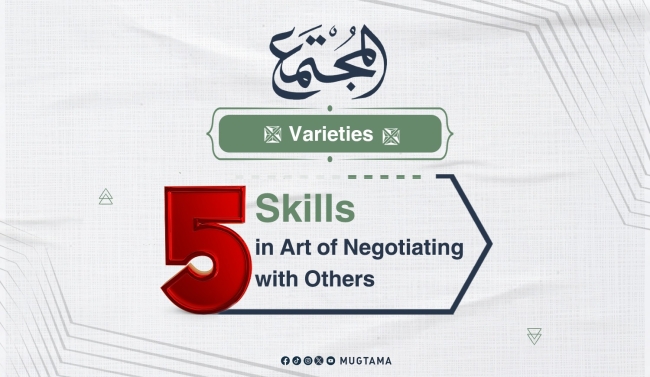Life may require a certain degree of flexibility and negotiation skills, whether in your job or during a crisis you want to emerge from with minimal losses and maximum gains. This is known as the "art of negotiation," which is now taught in economic, political, and military academies.
It's certain that we will all face this experience one day, whether negotiating for a salary raise, transitioning to a new job, seeking funding for a business, or aiming for better returns in trade. Life is full of developments and negotiations in pursuit of better opportunities. Therefore, it is essential to overcome shyness, be clear about your demands, and lay out the details on the table.
A British study from Stanford University provides the following recommendations:
1. Establishing Communication Bridges: Opening lines of communication with the other party paves the way for successful negotiation, as it helps break the ice between both sides and builds trust, leading to better outcomes. The study, which targeted students negotiating via email, showed that students who shared personal details beyond the scope of negotiation achieved much better results than those who conducted the negotiations in a formal, typical manner without engaging in small talk.
2. Politeness in Negotiation: The study advises maintaining politeness during negotiation instead of shouting, arrogance, or using offensive language, as such approaches will not yield the desired results and may even prevent the negotiation from happening. Using a polite tone, especially with women, tends to make the negotiation more calm and leads to better outcomes, as long as it’s not overdone, to avoid the other party feeling flattered or deceived
3. Specify Financial Details: It’s important to specify financial details, such as requesting a certain salary, and avoid using round numbers. Instead, ask for a specific amount, like 320 dinars or 460 dollars. This suggests that you’ve done a precise study to arrive at that specific figure, according to a research study from Columbia Business School. The study confirms that this method in negotiation makes the other party feel your honesty and professionalism, as you're negotiating based on specific, fixed criteria rather than just estimates or a desire for a large salary without considering your experience and capabilities.
4. Maintaining Eye Contact: Another study indicates that one of the most successful ways to gain others' trust is to maintain steady eye contact during discussions. Therefore, it’s important to use direct and steady eye contact and look the other party in the eyes during negotiation. Practicing this skill is essential because direct eye contact gives the other party the sense that you have enough confidence in yourself to engage in serious negotiation, and that you have a strong, positive personality capable of persuasion. On the other hand, avoiding eye contact may give the impression that you’re untrustworthy, hiding something, or have a weak personality, making the other party doubt your ability to handle the position or task effectively.
5. Face-to-Face Negotiation: Negotiators recommend not engaging in face-to-face negotiations unless you’re the stronger party, as the stronger party usually wins the negotiation due to having leverage. If you are in the weaker position, it’s better to negotiate over the phone or via email. Negotiating through indirect means gives you time to think, provided you organize your thoughts and prioritize, such as negotiating the salary first, then the workplace, then vacation days, and so on.
-------------------------------------------------------------


